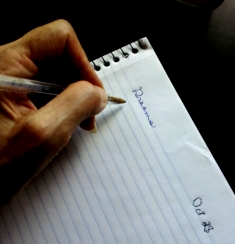
Recording Dreams
Dreamwork is the practice of regularly recording and reflecting on one’s dream in a conscious and applied manner with the intention to learn from the wisdom of dreams. It is not an easy task. In fact, it is probably one of the most challenging projects a person could take on, and yet, possibly one of the most rewarding.
Freud said dreams were “the royal road to the Unconscious.” Connecting to dreams is a direct method to connect to the Unconscious, the deepest part of you. So if you want to really get to know yourself through and through, doing dreamwork is one of the best ways to do it.
By committing to dreamwork, you are giving permission to the Unconscious to inform your waking life, bringing new and often challenging insights into a consciousness that is often protected from this greater reality by a tough Ego that wants to be safe, secure and in control. Often, the interests of Ego and the interests of Unconscious are at odds. This means:
- You may experience conflicting values in situations where your ego has learned to adapt, appease, turn a blind eye or, conversely, be overly critical and your Unconscious is suggesting a bolder, risky or more loving response.
- You may be presented with information about a situation you would rather not know. Dreams often can see the bigger picture and give information you do not pick up in waking consciousness or they may portend events in the future that may be hard to accept.
- Dreams may show you how powerful you can be if you forgo your fears and act on your dreams. Dreams may show you doing things in dreamtime you are frightened to do in your waking life—but in dreamtime accomplish with ease, grace and sometimes with the help of angelic beings. This is why the phrase “If you can dream it, you can do it” is so true. It’s like the holographic prototype model has already been tested in dreamtime, proving to you it can work.
By committing to dreamwork, then, you are committing yourself to be open to another level of awareness that calls you to move beyond the constraints of Ego limitations and into a world of limitless possibilities. What can be more exciting than that?



Keeping a Dream Journal
If you are serious about developing a deep connection with your inner self, this task is perhaps the best practice you can do. Keeping a dream journal involves writing down your dreams as they occur. Ideally, this would be just as you are waking up while the dream is still fresh in your mind. So keep a notebook and a pen (or digital diary–there are apps for that now if you can get technical while half awake!) next to your bed. If you are one of those people who can’t seem to remember your dreams, then try keeping a journal of whatever comes to mind that is important to you on a daily basis. For any kind of journaling, keep it simple. That will be the best assurance for encouraging you to be faithful about making regular entries into it. At a minimum each entry in a dream journal should include:
- The date
- A title for the dream (this will help you remember the dream as you remember a movie)
- A detailed description of the dream written in the present tense. Include every color, character, object, background, place, emotional feeling, and emotional nuance. Pay attention to the number of things occurring such as recording if there are 3 books or 2 people. It is important. Find and use a good dream dictionary—one that gives many meanings to each symbol and teaches dreamwork exercises. I like Cloud Nine: A Dreamer’s Dictionary by Sandra A. Thompson.
This practice will usually be all you have time to do on a regular basis. However, depending upon how thorough you want to be, you can do the following:
- Reserve a section either below or next to the dream where you make a note of any dreamwork done on the dream such as making associations with the dream symbols or make notes on what the dream may be about by using the other dream methods described below.
- If you have asked to have this dream prior to dreaming it, you should by all means write down the question or intention before having the dream. The point isn’t to be so thorough in analyzing every dream but to keep an ongoing consistent recording of every important dream and even the minor ones, if you have the self-discipline. You can always come back later and do additional dreamwork on any dream if you have done a good job of recording the dream in detail.
- If you have seen how this dream has helped, you may want to reserve space to add a note about this in the margin or in a space below the dreamwork section.
Also, what appears to be a minor dream to your waking mind can actually end up being of profound importance for the rest of your life, so please pay attention to the very short dreams and ones that don’t seem important. It might not be apparent at the moment, but you will see the dream’s significance in ten or twenty years down the road. You will see that your deeper consciousness is already preparing you for the major tasks that lie years ahead. Also you will want to record dream encounters with healers and guides whose presence you might want to honor later






